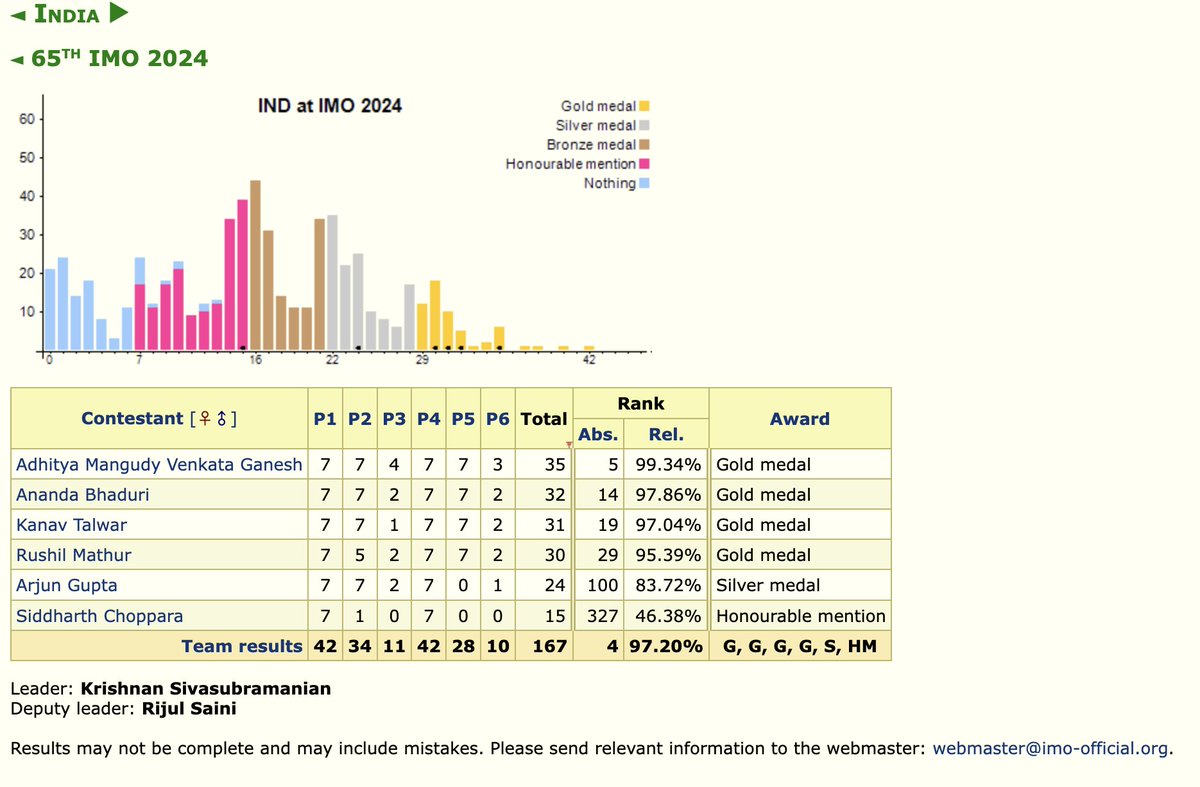Amber G. wrote: ↑03 Aug 2024 02:57
Just for fun..here is one easy one..
....
The answer has got to be 2.4. Here's the reasoning:
Let the numbers be a, b, c, d.
Obviously none of them are zero, since that would lead to multiple zeros in the pairwise products. But the pairwise products are 2, 3, 4, 5, 6, and x.
If one of a, b, c, d is negative, that would lead to three negatives in the pairwise products.
If two of a, b, c, d are negative, that would lead to 4 negatives in the pairwise products.
If three of a, b, c, d are negative, that would lead to 3 negatives in the pairwise products.
Thus, either all of a, b, c, d are negative, or all of them are positive.
If any two of a, b, c, d are the same number, that would lead to 4 of the pairwise products being the same.
If any three of a, b, c, d are the same number, that would lead to
at least 3 of the pairwise products being the same.
If all four are the same number, then obviously all the pairwise products would be the same. So a, b, c, d are distinct numbers.
Then we can order them as a < b < c < d. For positive a, b, c, d (the case where all of them are negative would simply be the same as the positive case, but with negative signs):
The pairwise products (PWPs) are ab, ac, ad, bc, bd, cd.
These PWPs would then necessarily have to be in the order:
ab < ac < (either ad or bc) < (either ad or bc) < bd < cd.
Now: ab * cd = ac * bd = ad * bc ---------------------------- (1)
Thus, if we take the PWPs 2, 3, 4, 5, 6, x - we need to be able to group them into three groups of 2 each, such that the product of each group is the same value.
Depending on the value of x, we can have:
x < 2 < 3 < 4 < 5 < 6; 2 < x < 3 < 4 < 5 < 6; 2 < 3 < x < 4 < 5 < 6; 2 < 3 < 4 < x < 5 < 6; 2 < 3 < 4 < 5 < x < 6; 2 < 3 < 4 < 5 < 6 < x
Using equation (1), for the above cases, we would have:
x * 6 = 2 * 5 = 3 * 4 -------- (impossible)
2 * 6 = x * 5 = 3 * 4 -------- (leads to x being 2.4)
2 * 6 = 3 * 5 = x * 4 -------- (impossible)
2 * 6 = 3 * 5 = 4 * x -------- (impossible)
2 * 6 = 3 * x = 4 * 5 -------- (impossible)
2 * x = 3 * 6 = 4 * 5 -------- (impossible)
Thus, x has to be 2.4. One can solve for two cases with this value of x:
ab = 2; ac = 2.4; ad = 3; bc = 4; bd = 5; cd = 6
(or) ab = 2; ac = 2.4; bc = 3; ad = 4; bd = 5; cd = 6
For the first case:
a = sqrt(6/5), b = sqrt(10/3), c = 1.2 * b, d = 2.5 * a
For the second case:
a = sqrt(8/5), b = sqrt(5/2), c = 1.2 * b, d = 2.5 * a
Obviously, the cases where
a=-sqrt(6/5), b = -sqrt(10/3), c = 1.2 * b, d = 2.5 * a
and
a = -sqrt(8/5), b = -sqrt(5/2), c = 1.2 * b, d = 2.5 * a
will also work.
In all these cases, the unknown sixth pairwise product is x = 2.4.









